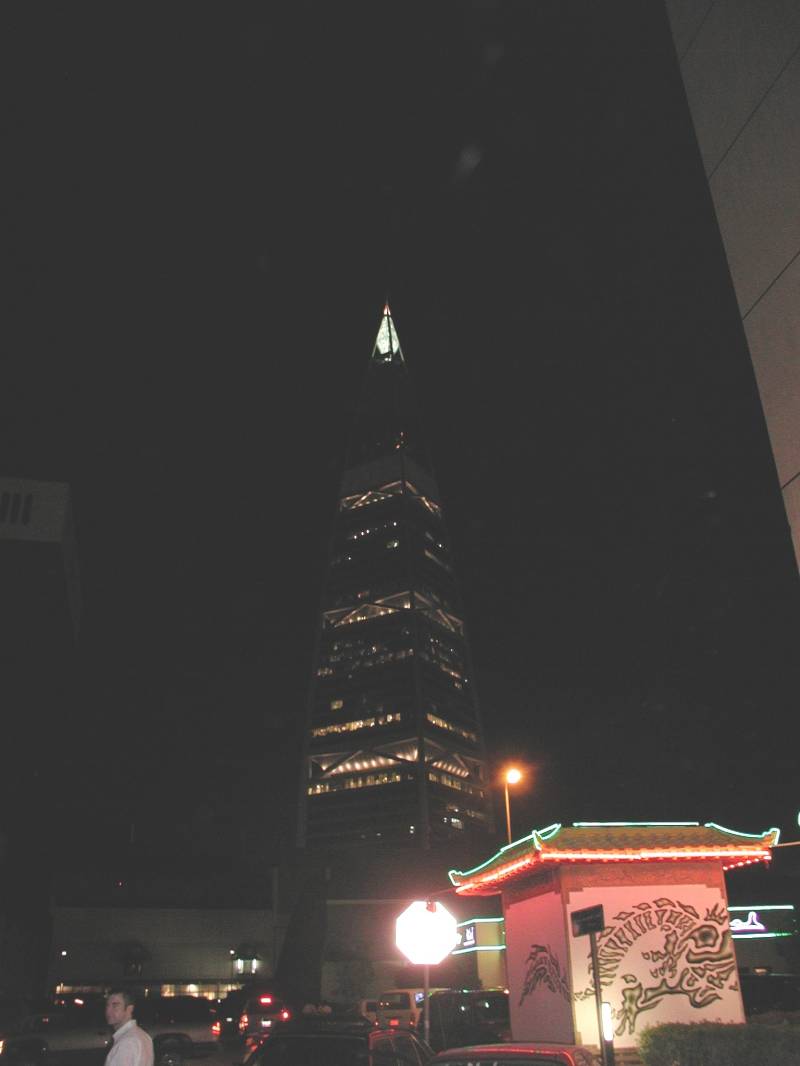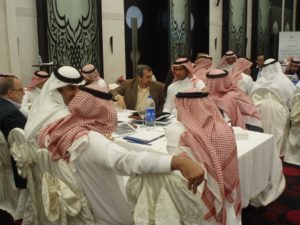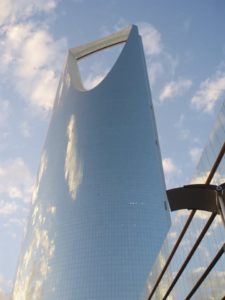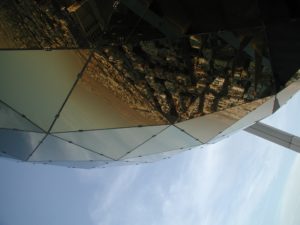
This was going to be my tenth visit to Saudi Arabia. Something interesting always happened on those journeys. One time I ended up sitting next to a Japanese man on the flight from Frankfurt to Riyadh. What caught my eye was that two other Japanese men seemed to be attending to his every move. When we came off the plane, he was greeted by high ranking Saudis. The next day I read in the paper that he was a former prime minister of Japan. Coincidentally, we were on the same return flight three days later. I wanted to ask him about Pearl Harbor but we were not in adjacent seats.
On this trip, I was accompanied by three Americans who were setting foot in the sands of Araby for the first time. As we came down the escalator at the Riyadh airport, we were greeted by marble floors, large plants and a giant fountain. The first companion commented, “This evokes the Luxor casino in Las Vegas.”

It had taken us 20 hours to get to Riyadh. We were tired and anxious to get to the hotel. But the immigration lines were slow. Outside, the weather was balmy. The second companion said: “It feels like Hawaii.” The next day a sand storm appeared out of nowhere, shattering the illusion.
We were staying at the French chain hotel, Novotel. No one spoke French. The staff were from the Subcontinent.
We had come to here to run a workshop on energy efficiency. The 90+ participants were drawn from the government, industry and academe. The biggest barrier to energy efficiency was the artificially low price of electricity. With low prices, it did not make any economic sense for homeowners and building owners to invest in energy efficiency.
Hoping to solve this enigma, I asked: “Who sets the price of electricity? I want to meet him.” The utility folks said it was the regulator, the regulator said it was the ministry, and the ministry simply said they had no control over the price. After much probing, one person finally confessed that His Majesty was setting the price and asked, “Do you want to meet the King?” I immediately dropped the subject. I did not want my head to be served to him on a platter.
Next up on the agenda was the noon prayer. This break was a novelty for my American friends. They stayed behind while I walked over to join the congregation at the mosque next door. Most of the worshippers were people from the Subcontinent.
The conference resumed in earnest but no one wanted to deal with the real issue. Then came the afternoon break. To get some fresh air, the four of us went out to get some fresh air on the hotel patio.
A 20-story high rise was being constructed across the street apparently with no insulation. At the workshop, we had been told that the most advanced codes and standards governed the construction of buildings. But someone else told us the royal family was involved in construction. That rendered enforcement of codes infeasible. In the Kingdom, you just learned to ignore certain things or you did not survive.

What happened next caused my mind to stop analyzing the laws of economics. A wobbly chain-and-pulley system of the kind that might be used in a science class to illustrate the laws of physics was being used to hoist heavy supplies upwards to the building under construction in a large basket. I worried that the basket might break, the load might spill out of it, the chain might break, or the pulley may snap. But that was the stuff of Hollywood thrillers, not of reality.
Just as my mind turned back to analyze ways of making energy efficiency more attractive in a country with heavily subsidized electricity prices, I discovered that the basket carrying the load had turned upside down. The 10’ long metal pipes were hurtling down toward us.
Even though we were 50 yards away, the wind quickly spread the metal pipes into a cone of death. The pipes quivered as they approached us, with sunlight glinting off the metal, like javelins thrown by the gods.
If we stayed where we stood, we would be impaled. We began to rush inside. The locals, clad in white Arab robes with the checkered head scarfs and black bands, outpaced us. An all-out stampede broke out. I was pushed aside by a man, white robe flying, who had seen the Angel of Death. He did not want to yield his soul.
Then came a deafening silence. We came out to survey the damage. One car’s windshield was damaged beyond repair. The glass was not shattered, just morphed into a spider web. The bent pipe which had hit the glass lay on the side. No emergency vehicles ever arrived. No sirens blared. This was not the US.

A worker picked up the bent pipe. Construction resumed as if nothing had happened. One of our clients, a Brit with Pakistani lineage, came out and told us not to stand together: “I do not want to lose all my consultants in one fell swoop.” That was British humor at its best.
There was nothing to do in the evenings. So we went to a shopping mall. The third companion asked for a group picture. I took out my camera. Before I could focus the lens, I felt a hand on my shoulder. In an Orwellian tone, the guard said, “No.” He followed up with another one-sentence command: “OK?” I looked at my three companions. Their expressions were precious.
On my last day, a client invited us to a banquet at his farm house. I had met him in Ireland a few months prior. Now we were his guests in a tent, sipping tea, seated on carpets and reclining against richly decorated pillows. This could have been a scene from the Arabian Nights but for the missing music and belly dancing.
Rice with large chunks of meat with fat on the bone was put in front of us. The meat was too large to be lamb. I dreaded eating camel.
Later, another client offered to drive me to the airport. The desert was pitch black. On the way, he asked me if I practiced extreme sex. Was I in the heart of darkness?
In the distance, the airport lights glimmered in the distance. He broke the silence by asking me to pray for him, saying the prayers of a traveler are always accepted.
On this trip, I was accompanied by three Americans who were setting foot in the sands of Araby for the first time. As we came down the escalator at the Riyadh airport, we were greeted by marble floors, large plants and a giant fountain. The first companion commented, “This evokes the Luxor casino in Las Vegas.”

It had taken us 20 hours to get to Riyadh. We were tired and anxious to get to the hotel. But the immigration lines were slow. Outside, the weather was balmy. The second companion said: “It feels like Hawaii.” The next day a sand storm appeared out of nowhere, shattering the illusion.
We were staying at the French chain hotel, Novotel. No one spoke French. The staff were from the Subcontinent.
We had come to here to run a workshop on energy efficiency. The 90+ participants were drawn from the government, industry and academe. The biggest barrier to energy efficiency was the artificially low price of electricity. With low prices, it did not make any economic sense for homeowners and building owners to invest in energy efficiency.
Hoping to solve this enigma, I asked: “Who sets the price of electricity? I want to meet him.” The utility folks said it was the regulator, the regulator said it was the ministry, and the ministry simply said they had no control over the price. After much probing, one person finally confessed that His Majesty was setting the price and asked, “Do you want to meet the King?” I immediately dropped the subject. I did not want my head to be served to him on a platter.
Next up on the agenda was the noon prayer. This break was a novelty for my American friends. They stayed behind while I walked over to join the congregation at the mosque next door. Most of the worshippers were people from the Subcontinent.
The conference resumed in earnest but no one wanted to deal with the real issue. Then came the afternoon break. To get some fresh air, the four of us went out to get some fresh air on the hotel patio.
A 20-story high rise was being constructed across the street apparently with no insulation. At the workshop, we had been told that the most advanced codes and standards governed the construction of buildings. But someone else told us the royal family was involved in construction. That rendered enforcement of codes infeasible. In the Kingdom, you just learned to ignore certain things or you did not survive.

What happened next caused my mind to stop analyzing the laws of economics. A wobbly chain-and-pulley system of the kind that might be used in a science class to illustrate the laws of physics was being used to hoist heavy supplies upwards to the building under construction in a large basket. I worried that the basket might break, the load might spill out of it, the chain might break, or the pulley may snap. But that was the stuff of Hollywood thrillers, not of reality.
Just as my mind turned back to analyze ways of making energy efficiency more attractive in a country with heavily subsidized electricity prices, I discovered that the basket carrying the load had turned upside down. The 10’ long metal pipes were hurtling down toward us.
Even though we were 50 yards away, the wind quickly spread the metal pipes into a cone of death. The pipes quivered as they approached us, with sunlight glinting off the metal, like javelins thrown by the gods.
If we stayed where we stood, we would be impaled. We began to rush inside. The locals, clad in white Arab robes with the checkered head scarfs and black bands, outpaced us. An all-out stampede broke out. I was pushed aside by a man, white robe flying, who had seen the Angel of Death. He did not want to yield his soul.
Then came a deafening silence. We came out to survey the damage. One car’s windshield was damaged beyond repair. The glass was not shattered, just morphed into a spider web. The bent pipe which had hit the glass lay on the side. No emergency vehicles ever arrived. No sirens blared. This was not the US.

A worker picked up the bent pipe. Construction resumed as if nothing had happened. One of our clients, a Brit with Pakistani lineage, came out and told us not to stand together: “I do not want to lose all my consultants in one fell swoop.” That was British humor at its best.
There was nothing to do in the evenings. So we went to a shopping mall. The third companion asked for a group picture. I took out my camera. Before I could focus the lens, I felt a hand on my shoulder. In an Orwellian tone, the guard said, “No.” He followed up with another one-sentence command: “OK?” I looked at my three companions. Their expressions were precious.
On my last day, a client invited us to a banquet at his farm house. I had met him in Ireland a few months prior. Now we were his guests in a tent, sipping tea, seated on carpets and reclining against richly decorated pillows. This could have been a scene from the Arabian Nights but for the missing music and belly dancing.
Rice with large chunks of meat with fat on the bone was put in front of us. The meat was too large to be lamb. I dreaded eating camel.
Later, another client offered to drive me to the airport. The desert was pitch black. On the way, he asked me if I practiced extreme sex. Was I in the heart of darkness?
In the distance, the airport lights glimmered in the distance. He broke the silence by asking me to pray for him, saying the prayers of a traveler are always accepted.
